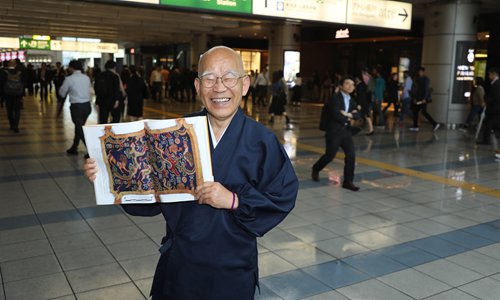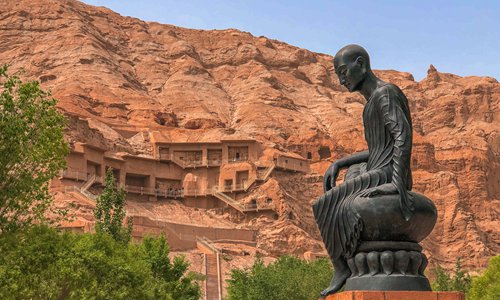HOME >> CHINA
Japanese monk finds ‘second home’ in China’s Xinjiang
By Liu Junguo Source:Global Times Published: 2019/5/23 19:08:01

Yasutaka Kojima holds up his book on Xinjiang near Shinagawa railway station in Tokyo on Tuesday. Photo: Liu Junguo/GT
He wears two things all the time: a cassock and a smile.Yasutaka Kojima, 77, is dubbed as "a Japanese man who has touched the whole Xinjiang."
Over the last 36 years, Kojima has worked on promoting communication and protecting the cultural heritage of Northwest China's Xinjiang Uyghur Autonomous Region.
Today he works for the government of Xinjiang as a culture consultant.
He never regrets his devotion to Xinjiang, which he regards as a second home.
Diamond entrepreneur
In 1966, Kojima formed a diamond company in Japan. He attended the China Import and Export Fair in October 1972, a month after normalization of China-Japan diplomatic relations.
He then kept visiting cities like Shanghai, Beijing and Tianjin for diamonds and craftwork.
Then in 1982, Kojima visited Xinjiang for the first time and was immediately attracted by the customs and culture.
"I was about to start a diamond business in Xinjiang, but that business did not work out and I fell deeply in love with the land," he told the Global Times.
In 1986, Kojima created a scholarship after his name at the Xinjiang University in Urumqi: He gave each student 150 yuan.
The next year, he became a Buddhist monk.
In 1996, he quit his job as president of a diamond company and devoted all his efforts to the friendship between China and Japan.
Kojima has visited Xinjiang more than 150 times and donated 35 million yuan to the region.
He has also supported the protection and restoration of the Kizil Thousand-Buddha Caves, as well as research at the ruins of Niya and Dandan Oilik.

The Kizil Caves complex in Aksu Prefecture is the largest of the ancient Buddhist cave sites associated with the ancient Tocharian kingdom of Kucha, as well as the largest in Northwest China's Xinjiang Uyghur Autonomous Region. Photo: Liu Xin/GT
He published a Picture Dictionary of Xinjiang World Heritage in Japan to share its beauty back home.
In 2008, the then Ministry of Culture of China honored Kojima with a Cultural Exchange Contribution Award.
Fast changes
Xinjiang has changed greatly since reform and opening-up in 1978, Kojima noted.
Xinjiang, which is located on the ancient Silk Road, is expected to develop even faster with the Belt and Road Initiative.
When he first went to Xinjiang, Kojima barely saw any vehicles. Sheep ate grass everywhere along the roads. "People totally relied on camels to transport goods," he said.
It took two days to travel from Urumqi to the Kizil Cave back then, he noted. "But now it only takes three hours in total by taking planes and cars," he said.
The last time Kojima visited Xinjiang was September. He met with Ren Hua, deputy governor of Xinjiang and attended an opening ceremony for an exhibition about the Niya ruins.
He also showed up for the 33rd Kojima scholarship ceremony at Xinjiang University.
To Kojima's eyes, Xinjiang has vast territory, beautiful scenery and hospitable people.
The region has maintained its magnificent natural environment and the people are honest, hospitable, warm-hearted and friendly. "I introduce Xinjiang to other people whenever I get a chance," he said.
In September Kojima led five senior company managers to Xinjiang.
He has made speeches, published books and appeared on TV shows to boost understanding of his favorite Chinese region. "I have never regretted my actions. I feel it was very meaningful," he said.
His wife, Satoko Kojima, has been to Xinjiang three or four times.
"She's a great wife and I am extremely appreciative. To support my activities in Xinjiang, she has even sold off her diamonds and golf club membership."
Promoting friendship
Kojima hopes more people will join in promoting China-Japan friendship.
"Japan and China should work together to increase friendly exchange activities at all levels in order to increase understanding of each other," he said.
In Record of International Cooperation of China's Xinjiang in 36 Years, a book published in Japan last year, Kojima shared heartfelt wishes to continue to contribute to Xinjiang cultural heritage protection, foster talent and increase understanding between China and Japan.
"I would like to bury my ashes in the Taklimakan Desert," he wrote at the end.
Newspaper headline: From far east to far west
Posted in: PROFILE